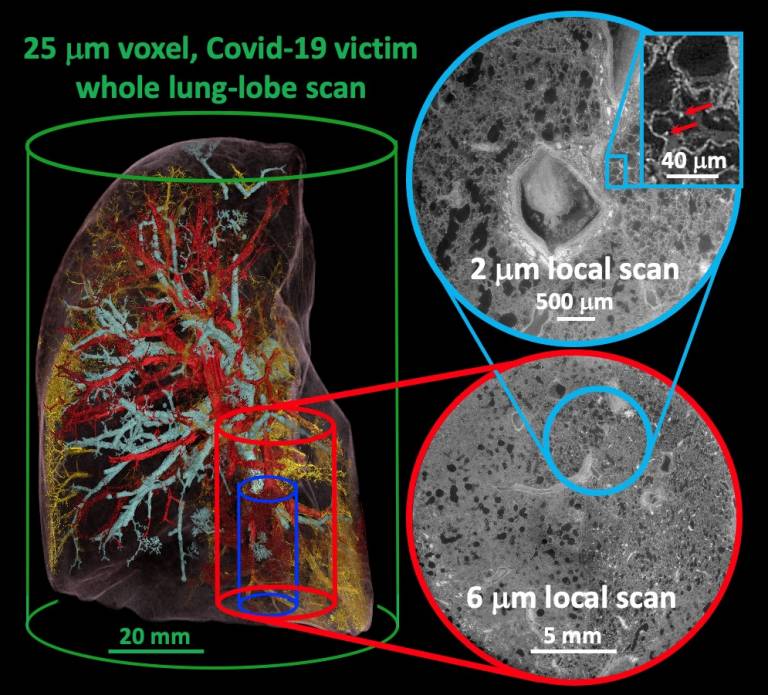Deep Learning guided Imaging to correlate imaging from a whole organ to cellular level
A 3-year funded PhD studentship - Now Closed

14 December 2020
Deep Learning guided Imaging to correlate imaging from a whole organ to cellular level
Primary Supervisor: Simon Walker-Samuel
A 3-year PhD studentship is available in the UCL Department of Mechanical Engineering, and Medical Physics and Biomedical Engineering. The funding covers an annual tax-free stipend (at least £17,009 p.a.) and tuition fees. The successful candidate will join the UCL CDT in Intelligent, Integrated Imaging in Healthcare (i4health) cohort and benefit from the activities and events organised by the centre.
Project Background
We have recently developed methods using high-energy X-rays, that allow us to create images of whole human organs at high resolution (ca. 1 µm) and in three dimensions. This allows us to better understand the complex structure and function of the human body, as well as to better understand changes caused by disease.
Our new imaging technique is similar to the X-ray CT used widely in conventional medical imaging but uses a synchrotron X-ray source based at the ESRF (European Synchrotron Radiation facility in Grenoble). This X-ray source offers the brightest and most coherent beam in the world, and, coupled to the HIP-CT technique we’re developing, allows us to image entire human organs (including lung, heart, brain) with 25µm resolution, and zoom in on cellular structures at ~1.2µm resolution without cutting the tissue. We have imaged human organs in health and disease (Covid-19 victims, see https://mecheng.ucl.ac.uk/HiP-CT)
The large data sets (~100GB) that this technology produces require advanced tools for meaningful interpretation and analysis, and for which we now apply deep learning. Deep learning (DL) has revolutionised medical imaging. It involves training a neural network (NN) to perform a specific image processing task (e.g. segmentation, classification, super-resolution or modality change) with an accuracy that can equal, or even outperform human experts. Successfully training a neural network, in a manner that can be generalised to new, unseen data, depends on having a large, expertly-labelled dataset. For example, for segmentation of blood vessels, manual labelling of HiP-CT data must be performed; for correlation to other modalities, such as histology, the histological images must be registered to the HiP-CT data.
Research aims
This project will initially develop and apply deep learning techniques to segment HiP-CT data (airways, blood vessels, cells, etc.) to enable biological insights to be drawn and for further biophysical simulations. A secondary aim will be to explore more advanced machine learning techniques such as generative adversarial networks, in order to correlate HiP-CT data with images from other modalities (such as histology, lightsheet, MRI and CT). This type of analysis will enable substantially better interpretation of HiP-CT so that it can provide quantitative biological and medical insights.
Requirements
Applicants should have a first degree in Physics, Mathematics or Computer Science (or a related subject), awarded at 2:1 level (UK system or equivalent) or above. Knowledge of basic image processing is required and strong computer programming skills are desirable.
Funding
Please note that the funding available supports Home students or EU nationals who have obtained ‘settled’ or ‘pre-settled status’ via the EU Settlement Scheme Please refer to the UCL website for further details about the EU Settlement Scheme. Confirmation of settlement status will be required at the point of application and should be provided as an additional document during the application process.
Further guidance relating to UKRI funding eligibility found here.
How to apply:
Please send an expression of interest and current CV to Prof Simon Walker-Samuel (simon.walkersamuel@ucl.ac.uk)
Deadline: Now Closed
 Close
Close

